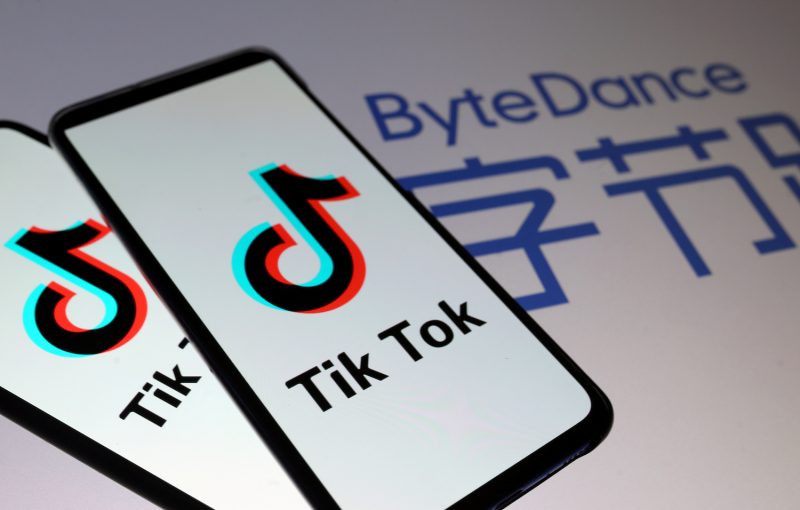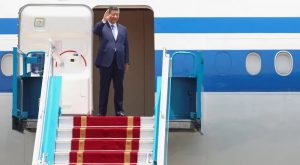Sources claim that TikTok’s parent ByteDance would prefer to shut the app rather than sell it, if the Chinese company exhausts legal options to fight a new law that will ban the platform on concerns over its owners.
They say the algorithms that TikTok relies on are too important to overall operations and would make a move to sell the app unlikely.
TikTok accounts for a small share of ByteDance’s total revenues and daily active users, so the group would rather let the app shut in the US in a worst-case scenario than sell it to an American buyer, sources close to the parent allege.
ALSO SEE: China Voices Concern on ‘Negative Factors’ in Dealings With US
A shutdown would have “limited impact” on ByteDance’s business while the company would not have to give up its core algorithm, according to the sources, who declined to be named as they were not authorised to speak to the media.
ByteDance declined to comment.
It said late on Thursday in a statement posted on Toutiao, a media platform it owns, that it had no plan to sell TikTok, in response to an article by The Information saying ByteDance is exploring scenarios for selling TikTok’s US business without the algorithm that recommends videos to TikTok users.
In response to a request for comment, a TikTok spokesperson referred to ByteDance’s statement posted on Toutiao.
TikTok’s CEO Shou Zi Chew said on Wednesday the social media company expects to win a legal challenge to block legislation signed into law by President Joe Biden that he said would ban its popular short video app used by 170 million Americans.
The bill, passed overwhelmingly by the US Senate on Tuesday, is driven by widespread worries among US lawmakers that China could access Americans’ data or use the app for surveillance.
Biden’s signing sets a January 19 deadline for a sale – one day before his term is poised to expire – but he could extend the deadline by three months if he determines privately owned ByteDance is making progress.
TikTok’s value hard to assess
ByteDance does not publicly disclose its financial performance or the financial details of any of its units. The company continues to make most of its money in China, mainly from its other apps such as Douyin, the Chinese equivalent of TikTok, separate sources have said.
The US accounted for about 25% of TikTok’s overall revenues last year, a separate source with direct knowledge said.
Reuters interviewed more than half a dozen investment bankers who said it was tough to value how much TikTok is worth compared with like-for-like competitors Meta Platforms’ Facebook and Snap, as TikTok’s financials are not widely available nor easy to access.
ByteDance’s 2023 revenues rose to nearly $120 billion in 2023 from $80 billion in 2022, said two of the four sources. TikTok’s daily active users (DAUs) in the US also make up just about 5% of ByteDance’s DAUs worldwide, one source said.
Core algorithms shared
TikTok shares the same core algorithms with ByteDance domestic apps like short video platform Douyin, three of the sources said. Its algorithms are considered better than ByteDance rivals such as Tencent and Xiaohongshu, one said.
It would be impossible to divest TikTok with its algorithms as their intellectual property licence is registered under ByteDance in China and thus difficult to disentangle from the parent company, the sources said.
Moreover, separating the algorithms from TikTok’s US assets would be a complicated procedure and ByteDance is unlikely to consider that option, the sources claimed.
ByteDance also would not agree to sell one of its most valuable assets – its “secret sauce” – to rivals, the four sources said.
In 2020, the Trump administration sought to ban TikTok and Chinese-owned WeChat but was blocked by the courts. The short-form video app has since faced partial and attempted bans in the US and other countries.
China indicated it would be likely to reject a forced divestment of the TikTok app during a US congressional hearing in March last year.
“China will firmly oppose it (the forced sale of TikTok),” said a spokeswoman for the Ministry of Commerce at a news conference in Beijing in late March 2023.
“The sale or divestiture of TikTok involves technology export and must go through administrative licensing procedures in accordance with Chinese laws and regulations.”
China in 2020 unveiled the Export Control Law and the final text extended the definition of “controlled items” from prior drafts. According to state media, the amendment ensures that the exports of algorithms, source codes and similar data are subject to an approval process.
Excluding algorithms, TikTok’s main assets include user data and product operations and management, two of the people said.
Former US Treasury Secretary Steven Mnuchin has expressed interest in putting together an investor group to try to buy TikTok. ByteDance may struggle to attract any buyers for TikTok’s US assets excluding algorithms, the sources said.
ByteDance, backed by Sequoia Capital, Susquehanna International Group, KKR & Co and General Atlantic among others, was valued at $268 billion in December when it offered to buy back around $5 billion worth of shares from investors, Reuters reported at the time.
- Reuters with additional editing by Jim Pollard
ALSO SEE:
TikTok Vows ‘We Will Fight’ After Biden Signs Sale Order
Chinese Hackers Poised to Strike at US Infrastructure: FBI Director
Chinese Spies Targeting Dutch Tech: Intelligence Agency
China’s Theft of Trade Secrets Our No1 Concern: US Patent Chief
‘If They Pass It, I’ll Sign It’: Biden Backs Bill to Ban TikTok
TikTok, US Lawmakers in War of Words as Bill to Ban App Gets Fuel
Suspicion And Mistrust Continuing to Shadow TikTok
TikTok Hit With $370m EU Fine Over Children’s Data Breaches
Beijing Slams US for TikTok CEO’s ‘Hostile’ Congress Hearing
























